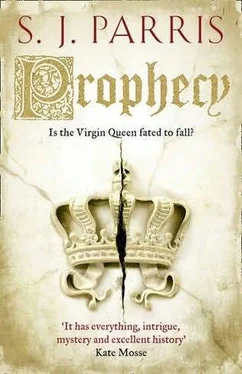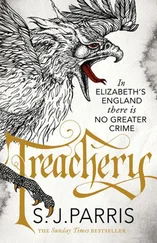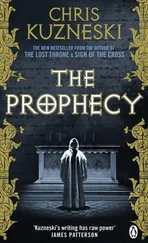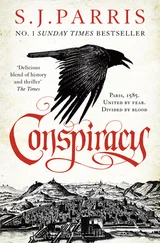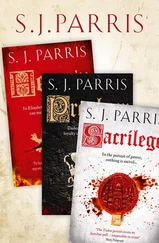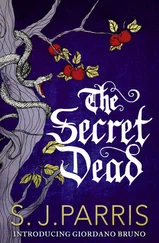Recovering my balance, I turn, smiling widely. Here is the bridegroom in all his finery, six feet tall and flushed with wine and triumph: breeches of copper-coloured silk so voluminous it is a wonder he can pass through a doorway; doublet of ivory sewn all over with seed-pearls; a lace ruff at his neck so severely starched that his handsome, beardless face seems constantly straining to see above it, like a small boy peering over a wall. His hair still sticks up in the front like a schoolboy hastened out of bed. In all the tumult I have not exchanged a word with him since the morning’s ceremony, he and his young bride have been so comprehensively surrounded by high-ranking well-wishers and relatives, all the highest ornaments of Her Majesty’s court.
‘Well,’ he says, grinning broadly, ‘aren’t you going to congratulate me, then, or are you just here for the food from my table?’
‘Your father-in-law’s table, I had thought,’ I answer, laughing. ‘Or which part of the feast did you buy yourself?’
‘You can leave your debating-hall pedantry at home today, Bruno. But I hope you have had enough meat and drink?’
‘There is enough meat and drink here to feed the five thousand.’ I indicate the two long tables at each end of the great hall, spread with the detritus of the wedding banquet. ‘You will be eating left-overs for weeks.’
‘Oh, you may be sure Sir Francis will see to that,’ Sidney says. ‘Today, generosity, tomorrow — thrift. But come, Bruno. You have no idea how it pleases me that you are here.’ He holds his arms wide and I embrace him with sincere affection; I am the perfect height to have his ruff smack me directly in the nose.
‘Watch the clothes,’ he says, only half-joking. ‘Bruno, allow me to introduce you to my uncle Robert Dudley, Earl of Leicester.’
He steps back and gestures to the man who stands a few feet away, at his shoulder; a man of about Sidney’s own height, perhaps in his mid-fifties yet still athletic, his hair steel grey at the temples but his face fine-boned and handsome behind his close-clipped beard. This man regards me with watchful brown eyes.
‘My lord.’
I bow deeply, acknowledging the honour; the Earl of Leicester is one of the highest nobles in England and the man who enjoys greater influence over Queen Elizabeth than any alive. I raise my head and meet his shrewd appraisal. It is rumoured that in their youth he was the queen’s only lover, and that even now their long-enduring friendship is more intimate than most marriages. He smiles, and there is warmth in his gaze.
‘Doctor Bruno, the pleasure is mine. When I learned of your courage in Oxford I was eager to make your acquaintance and thank you in person.’ Here he lowers his voice; Leicester is the Chancellor of the University of Oxford, charged with enforcing the measures to suppress the Catholic resistance among the students. That the movement had gathered so much momentum on his watch had been a matter of some embarrassment to him; my adventures with Sidney there in the spring had helped to disarm it, at least temporarily. I am about to reply when we are interrupted by a man dressed in a russet doublet, with a peasecod belly so vast it makes him look as if he is with child; the earl nods politely to me and I turn back to Sidney.
‘My uncle likes the idea of you. He’s keen to hear more of your outrageous theories about the universe.’ I must look anxious, because he elbows me cheerfully in the ribs. ‘Leicester’s friendship is worth a great deal.’
‘I am glad to have met him,’ I say, rubbing my side. ‘And may I now pay my respects to your bride?’
Sidney looks around, as if for someone to deal with this request.
‘I dare say she is here somewhere. Giggling with her ladies.’ He does not sound as if he is in a hurry to find her. ‘But you are needed elsewhere.’
He turns and bows to my companion, who has discreetly withdrawn a couple of paces to watch us from under lowered lids, her hands modestly clasped together. ‘I am borrowing the great Doctor Bruno for a moment. I will return him to you at some stage. There will be more dancing after the masques.’ The girl blushes, smiles shyly at me and obediently melts away into the brightly coloured, rustling mass of guests. Sidney looks after her with an expression of amusement. ‘Lady Arabella Horton has her sights set on you, it seems. Don’t be fooled by all the fluttering lashes and simpering. Half the court has been there. And she will soon lose interest when she learns you are the son of a soldier, with no capital but your wit and a pittance from the King of France.’
‘I was not planning to tell her that immediately.’
‘Did you tell her you were a monk for thirteen years?’
‘We had not got around to that either.’
‘She might like that — might want to help you make up for lost time. But for now, Bruno, my new father-in-law suggests you might like to take a turn in the garden.’
‘I have not yet had the chance to congratulate him.’
But it is clear that this is business. Sidney rests a hand on my shoulder.
‘No one has. Do you know, he disappeared for two hours altogether this afternoon to draft some papers? In the middle of his own daughter’s wedding party?’ He smiles indulgently, as if he must tolerate these foibles, though we both know that Sidney is in no position to complain; financially, he needed this marriage more than young Mistress Walsingham, who I suspect entertains greater romantic hopes of it than her new husband.
‘I suppose the great machinery of state must keep turning.’
‘Indeed. And now it is your turn to grease the wheels. Go to him. I shall find you later.’
On all sides we are pressed by those who wish to congratulate the bridegroom; they jostle, aggressively smiling and attempting to shake his hand. In the melee I slip away towards the door.
Outside, the night air is hard-edged with the first frost of autumn and the grounds are quiet, a welcome relief from the celebrations inside. In the knot-garden close to the house, lanterns have been lit and couples walk the neatly cultivated paths, murmuring, their heads close together. Even in the shadows, I can see that Sir Francis Walsingham is not to be found here. Stretching my arms, I strain my head back to gaze up at the sky, the constellations picked out in bright silver against the ink-blue of the heavens, their arrangement different here from the sky above Naples where I first learned the star-patterns as a boy.
I reach the end of the path and still there is no sign of him, so I set off across the open expanse of lawn, away from the lit paths, towards an area of woodland that borders the cultivated part of the garden at the back of Walsingham’s country house. As I walk, a lean shape gathers substance out of the shadows and falls into step beside me. He seems made of the night; I have never seen Walsingham wear any suit other than black, not even today, at his daughter’s wedding, and he wears still his close-fitting black velvet skullcap, that makes his face yet more severe. He is past fifty now and I have heard he has been ill this last month — one of the protracted bouts of illness that confines him to his bed for days at a time, though if you enquire after his health he swats the question away with a flick of his hand, as if he hasn’t the time to consider such trifles. This man, Queen Elizabeth Tudor’s Principal Secretary, though he may not seem an imposing figure at first glance, holds the security of England in his hands. Walsingham has created a network of spies and informers that stretches across Europe to the land of the Turks in the east and the colonies of the New World in the west, and the intelligence they bring him is the queen’s first line of defence against the myriad Catholic plots to take her life. More remarkably still, he seems to hold all this intelligence in his own mind, and can pluck any information he requires at will.
Читать дальше
Конец ознакомительного отрывка
Купить книгу
